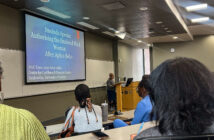In order to prepare seniors and soon-to-be graduates for the decisions they will face in the near future, Matthew Melone, professor of business law, shared his knowledge of ethical issues in business during a discussion on ethics and the job search Nov. 6.
Whether an internship or a job offer, Melone stressed the importance of understanding all of the entities that a job entails. In other words, he warned that students have full knowledge of the job they are signing up for prior to accepting it.
Melone is also a course coordinator for BUS 005: Value-Based Decision-Making at Lehigh. This course is a core requirement for Lehigh business students because it focuses on ethical issues in business.
“It’s important for students to understand the ethical responsibilities that come along with a job offer and Professor Melone is an excellent speaker on the topic,” said Jamie Pugh, associate director of the Rauch Center for Business said. “It’s both an exciting and scary time for Lehigh seniors as they try to make a decision about their first job. We are trying to help our students make as informed a decision as possible.”
Although this aspect of ethical business issues is looked over by many students because they are busy striving to secure their job position, Melone explained why it’s important to make your interests and intentions clear to future employers and how harmful it may be if not done so correctly.
When a student receives a contract from their potential or future employer, Professor Melone advised them to thoroughly understand the contract and evaluate what the company offers them in connection to what the student believes they deserve.
“You don’t want to tell somebody that you want to go there unless you’re ready to sign,” Melone said.
He explained how this could also mean that the student may not really be interested in the job position, or they may still explore other opportunities. Melone suggests that they use other kinds of verbal commitments that show appreciation and thought without fully accepting and committing to an unwanted job.
“It’s all about language,” he said. “Don’t say, ‘I’m definitely coming’ if you’re not.”
The student’s alternative to telling an employer that they can’t wait to work for them when they don’t have any real interest, is politely saying that they will think about the offer or that they appreciate the offer and will get back to them with a decision.
Professor Melone reminded students that a decision does not have to be made at the exact time of the offer. Most offers have a deadline or an “expiration date” that allows students to take the time and figure out their decision before getting back to the employer.
Melone also discussed how many students fear that the position will be given to another candidate if they bring up any kind of negotiation with the employer.
Henry Smither, ’15, attended the discussion and agreed that negotiating can be a touchy subject to enter as new graduate.
“I believe negotiating is appropriate in some cases but I can see how it can be a scary thing to do especially when you want to accept the job,” Smither said.
However, Melone made it clear that negotiations are always ethical when they are brought up in the proper manner.
“If you don’t agree with the firm’s offer, I think ethically you don’t have a moral obligation to sign,” he said.
Although students may be attracted to some aspects of an offer, and may even want the position, Melone makes it clear that it isn’t unethical to reject an offer based on some disagreements. He noted that at this time students’ negotiation skills may come into play.
“Everything’s fair game,” he said. “Don’t be afraid to negotiate.”
Melone said that if the student has preferences from their work location and monetary requests, to scholarship requests for furthering their education, they have the right to negotiate with the employer in a respectful way. Asking never hurts if it is done nicely and it is always important for the student to make their requests clear while negotiating with a future employer.






Comment policy
Comments posted to The Brown and White website are reviewed by a moderator before being approved. Incendiary speech or harassing language, including comments targeted at individuals, may be deemed unacceptable and not published. Spam and other soliciting will also be declined.
The Brown and White also reserves the right to not publish entirely anonymous comments.